- Home
- Bianca Blythe
Lords, Snow and Mistletoe: A Regency Christmas Collection
Lords, Snow and Mistletoe: A Regency Christmas Collection Read online
Table of Contents
LORDS, SNOW AND MISTLETOE: A REGENCY CHRISTMAS COLLECTION
Newsletter
THE WRONG HEIRESS FOR CHRISTMAS
Chapter One
Chapter Two
Chapter Three
Chapter Four
Chapter Five
Chapter Six
Chapter Seven
Chapter Eight
Chapter Nine
Chapter Ten
Chapter Eleven
Chapter Twelve
Chapter Thirteen
Chapter Fourteen
Chapter Fifteen
Chapter Sixteen
Chapter Seventeen
Chapter Eighteen
Chapter Nineteen
Chapter Twenty
Chapter Twenty-One
Chapter Twenty-Two
Chapter Twenty-Three
Chapter Twenty-Four
Chapter Twenty-Five
Epilogue
THE EARL’S CHRISTMAS CONSULTANT
Chapter One
Chapter Two
Chapter Three
Chapter Four
Chapter Five
Chapter Six
Chapter Seven
Chapter Eight
Chapter Nine
Chapter Ten
Chapter Eleven
Chapter Twelve
Chapter Thirteen
Chapter Fourteen
Chapter Fifteen
Chapter Sixteen
Chapter Seventeen
Chapter Eighteen
Chapter Nineteen
Chapter Twenty
Chapter Twenty-One
Chapter Twenty-Two
Chapter Twenty-Three
Epilogue
HOW TO CAPTURE A DUKE
Prologue
Chapter One
Chapter Two
Chapter Three
Chapter Four
Chapter Five
Chapter Six
Chapter Seven
Chapter Eight
Chapter Nine
Chapter Ten
Chapter Eleven
Chapter Twelve
Chapter Thirteen
Chapter Fourteen
Chapter Fifteen
Chapter Sixteen
Chapter Seventeen
Chapter Eighteen
Chapter Nineteen
Chapter Twenty
Chapter Twenty-one
Chapter Twenty-two
Chapter Twenty-three
Chapter Twenty-four
Chapter Twenty-five
Chapter Twenty-six
Chapter Twenty-seven
Chapter Twenty-eight
Chapter Twenty-nine
Chapter Thirty
Chapter Thirty-one
Epilogue
About the Author
LORDS, SNOW AND MISTLETOE: A REGENCY CHRISTMAS COLLECTION
Indulge in three wonderful regency-set historical Christmas romances.
#1 The Wrong Heiress for Christmas
#2 The Earl’s Christmas Collection
#3 How to Capture a Duke
THE WRONG HEIRESS FOR Christmas
Celia might be the daughter of an earl, but she’s of the illegitimate variety. She has resigned herself to life as a maid for the wicked countess and her two half-sisters. When Celia’s half-sister begs her to pretend to be her at a Christmas house party, Celia is thrust into a fairy tale. Everyone knows though that fairy tales never come true...
THE EARL’S CHRISTMAS Consultant
Christmas has never been Lord Wolfe McIntyre’s favorite season. His parents never celebrated it, and he never imagined he would succumb to sentimentality as an adult. After all, he runs a gaming hell. But when his sister’s engagement is broken, Wolfe vows to host a magnificent holiday ball so his sister can find a husband before the next season. The only problem? His lack of knowledge about the holiday. This earl requires a Christmas consultant.
HOW TO CAPTURE A DUKE
A bluestocking in need of a fiancé to present to her grandmother at Christmas is mistaken for a highwaywoman and decides she may as well borrow the handsome passenger.
Indulge in this regency holiday collection!
Newsletter
To instantly receive the free regency novella, The Perfect Fiancé, sign up for Bianca’s author newsletter at join.biancablythe.com.
THE WRONG HEIRESS FOR CHRISTMAS
Lord Frederick Bowen, Duke of Salisbury, is expecting an heiress for Christmas. The fact does not bring him pleasure. Ever since the war ended, he would rather focus on conducting experiments for his new waterproof material.
Celia might be the daughter of an earl, but she’s of the illegitimate variety. She has resigned herself to life as a maid for the wicked countess and her two half-sisters.
When Celia’s half-sister begs her to pretend to be her at a Christmas house party, Celia is thrust into a fairy tale. Everyone knows though that fairy tales never come true...
Other books in the Matchmaking for Wallflowers series:
How to Capture a Duke
A Rogue to Avoid
Runaway Wallflower
Mad About the Baron
A Marquess for Convenience
Chapter One
Matchmaking for Wallflowers
The Christmas season is upon us and even the pessimistic seem prone to fanciful leaps.
Lady Fitzroy and her daughter, Lady Theodosia, are attending an intimate house party with the Duke of Salisbury.
His Grace may be a duke, but the man lacks a ducal air. He takes more pleasure in presenting to the Royal Society of Scientists than escorting women to balls. Even footmen surpass him in aristocratic demeanor.
Disagreeableness is no virtue, and His Grace’s ample possession of it in no manner makes up for his lack of sense. One hopes Lady Fitzroy will forsake her plans to marry her darling daughter to so despised a man.
Lady Theodosia’s charm is renowned, and one pities Lady Theodosia for being raised by a mother devoid of basic intellect. We believe her more suited to a Frenchman such as the dashing Vicomte Espadon who has never expressed interest in the chemicals with which the Duke of Salisbury is obsessed.
Alas, one can only imagine Lady Fitzroy hiding behind curtains to thrust her daughter into the duke’s unwilling arms when not searching in the library for methods to blackmail him into a match.
- Anonymous Contributor Bequeathed with Sageness, Sapience and Shrewdness
“I hope you have not forgotten where my room is, Celia.” Lady Fitzroy’s strident voice soared through the corridor.
Had Celia been disposed to using the coarser words listed in the most comprehensive dictionaries, she may have selected one.
She should be accustomed to Lady Fitzroy.
She’d known the countess her entire life.
Celia willed her heartbeat to slow. It didn’t need to be galloping in her chest. Not when there was nowhere to go. Not when there would never be anywhere to go. Maids did not stray far from the ladies whom they served.
She brushed past the ornate ebony and coral lacquered sideboards and oversized vases, careful to avoid swishing the hem of her dress against the inconveniently sized embellishments. Polished mirrors sparkled throughout the corridor. Other houses might favor landscapes and portraits, but Lady Fitzroy insisted even Gainsborough himself could not create a painting which exceeded her face in loveliness.
In that, Lady Fitzroy may have been correct.
Lady Fitzroy was exquisite.
Her noteworthy lineage had not been the only reason she’d been chosen to be
the late earl’s bride, and Celia’s stomach tightened in a familiar manner.
What had mother thought?
Celia entered the room, still holding her tray.
Lady Fitzroy took out her quizzing glass, and the tangerine plumes on her embroidered turban flittered.
It was no use to say she’d been on her way to bring Theodosia her tea. The new Matchmaking for Wallflowers lay closed on the coffee table. Thank heavens. Once Lady Fitzroy read the unflattering article, the countess would not be dissuaded from her instinct toward unpleasantness.
Lady Fitzroy narrowed her perfectly plucked brows. “Your hair is appalling.”
“Oh!” Celia lifted a hand toward her head self-consciously, and the tray wobbled.
“Loose tendrils,” Lady Fitzroy admonished. “A servant’s hair should be combed tightly back. A servant should never take an interest in fashion. Your only interest is this household.”
“Yes, my lady.” Celia almost marveled at the countess’s incessant ability to create novel rebukes.
Celia had comforted many maids who’d shuddered under Lady Fitzroy’s scolding. The butler scrambled even to find footmen willing to subject themselves to Lady Fitzroy’s inevitable tirades. The most recent hire had lasted only a week.
No one, though, received more harangues than Celia.
It’s my destiny.
After all, Celia had the same glossy dark hair that curled in exquisite tendrils, the same clear alabaster skin that shone from the portraits at Fitzroy Place, and the same peaches and cream complexion that had made past portraitures to the manor home think they’d found their Mona Lisa.
Unfortunately even if Celia’s resemblance to the Fitzroy family was undeniable, there was one problem: she was not a Fitzroy.
She was the maid.
Just as her mother had been.
The countess seemed temporarily satisfied at having criticized Celia’s coiffure. “You brought tea. Set it on the table.”
“But it’s for—”
The countess gave her an icy frown. “And you brought gingerbread biscuits.”
“Yes,” Celia confirmed. The biscuits were obvious. The scent of ginger and cinnamon wafted toward her nostrils.
Christmas was the most delightful time of the year.
“Do you want to let out all my dresses?” Lady Fitzroy asked.
Celia shook her head.
“Would you take pleasure in pawing the silks and velvets a person like you should never be allowed to touch?”
Celia stiffened. “Of course not, my lady.”
“Because I assure you, I would make any unseemly pleasure you might experience at the expansion of my waistline not worthwhile.”
Celia swallowed hard.
The gingerbread biscuits were not even intended for Lady Fitzroy. They were for Lady Fitzroy’s daughter.
Still.
Given Lady Fitzroy’s negative reaction, Celia hardly desired to reveal that.
Though Lady Amaryllis sometimes seemed eager to rival her mother in admonishments, Theodosia was the person who was nicest to Celia.
Celia had no desire to direct Lady Fitzroy’s wrath on anyone else. She placed the tea on a table and left the gingerbread on the tray.
Lady Fitzroy picked up a biscuit absentmindedly and bit into it. Her lashes still moved downward, and for a second her face seemed consumed with bliss.
Celia almost smiled.
Lady Fitzroy’s face almost appeared placid, as if reflecting on the taste of cinnamon and treacle.
No one can be immune to the joys of Christmas.
“Remember to bring Theodosia’s gowns,” the countess said. “They are each more valuable than the income you’ll ever make in your life.”
“They are already packed. As are yours.”
Theodosia and Lady Fitzroy were bound for Yorkshire. Though Celia should be thankful for having fewer dresses to press, she would miss Theodosia.
“Hmph.” Lady Fitzroy bit into the gingerbread.
Celia took the countess’s silence as a sign to leave. She curtsied and hastened from the room. She hurried down the steps and made tea.
The kitchen bustled with activity.
“Did Lady Theodosia read the article yet?” Polly asked.
Celia shrugged. “Lady Fitzroy called me into her room. But I don’t think she had.”
“Good,” the Cook said. “Disgraceful pamphlet. You should never have been reading it, Polly. It doesn’t belong to you.”
“It was so tempting,” Polly said. “And one does want to know which colors are in fashion.”
“Green and red,” Cook said sternly. “It’s Christmas.”
Celia smiled and added fresh gingerbread onto the tray for Theodosia. She wiped sweat from her brow.
Cook assessed her. “Don’t you forget the housekeeping position. This will all be over soon.”
Celia smiled. “A lovely thought.”
Lady Fitzroy would never agree to give her a reference, but the housekeeper would retire soon and had offered to train Celia to take on some of her duties.
She pushed open the wooden door that led from the kitchen and hurried up the rickety stairs, expertly avoiding the loose step. Lady Fitzroy might value sumptuous surroundings, but that desire did not extend to the most meager maintenance of the servants’ divisions.
Celia ducked her head to avoid a beam and then opened the door to the main quarters. She then rushed up the stairs, hastened along the corridor and entered the room.
Theodosia reclined on a chaise lounge, clutching a fan in an elegant manner, even though the drop in the temperature scarcely demanded a need for one. Her lace gown was elegant against the tufted upholstery, and letters, likely from the vicomte, were strewn over her lap.
Theodosia had returned to England speaking of a Frenchman with such enthusiasm that her uncle apparently had been driven to depart the Cote d’Azur early.
Well.
At least Theodosia didn’t seem upset by the depiction in Matchmaking for Wallflowers.
Celia placed the tea at Theodosia’s table. “Let me change you into your traveling gown.”
“When this dress is so beautiful?” Theodosia smoothed the fabric with the self-satisfied attention of a cat preening itself.
“For safety—”
“Heavens.” Theodosia rose, still clutching her letters. “One would suppose the rest of the country were unclothed. The English ways are so tiresome. Not like the French. Besides the house party is in Yorkshire. I cannot go to Yorkshire.”
Celia smiled. “You were just there. You raved about it.”
Theodosia winced. “I was so naïve in those days. That was before I visited France. Before I swam in the azurean sea. Before I met—Pierre.” Theodosia adopted a dreamy look, while Celia arranged Theodosia’s attire in neat stacks and closed the lid of the last trunk.
Celia carried the trunk to the door, careful to avoid disturbing the neatly swept lines of the oriental carpet. Theodosia might amble on the carpet nonchalantly, but servants were not allotted that pleasure. Ever since one of Lady Fitzroy’s friends had mentioned George III demanded servants avoid the carpet, the countess had insisted her household do the same, no matter that she was neither a king nor mad.
Celia’s arms strained under the awkward weight of the trunk, and Theodosia assessed her with a frown.
“Perhaps we won’t have to go if we ruin the trunk,” Theodosia said. “We could submerge it in water. Perhaps throw it into the bath.”
“I suspect the servants would pull the trunk from the bathtub before they pour hot water into it. Though it is an improvement on your other suggestions since it does not involve destroying the wheel of the carriage, unhooking the horses, or pretending to be ill and bribing the doctor to comply.”
“The latter is doable,” Theodosia protested. “The poor doctor’s shoes appeared worn. He is certain to be persuadable.”
“And if he is not?”
Theodosia jerked her gaze away. �
��You’re correct. You always are.”
Celia’s smile faltered. When they were younger and the earl had still been alive, they’d taken classes together. Celia had excelled in every subject.
That didn’t change the fact Celia would remain a servant.
“Perhaps Pierre will rescue me,” Theodosia mused.
Ever since she’d returned from Antibes, she’d been spending much of the time speaking about a certain Frenchman.
Apparently he was dashing.
And charming.
And utterly spectacular.
Theodosia ascribed most positive adjectives to the vicomte’s qualities and relegated negative adjectives to describe the torture of their separation.
“You might find His Grace charming,” Celia said.
“I am spoken for. Please do my hair.”
Celia picked up the comb on the vanity.
“I imagine everyone already suspects. I’ve been mentioned in Matchmaking for Wallflowers.”
“Polly told me.”
Theodosia beamed. “See. Everyone will know.”
“Poor mama will be shattered to be seen as so marriage-minded. She does value subtlety.”
“I’m so sorry,” Celia said. “If it’s any consolation, I don’t believe she’s read it yet.”
“She will,” Lady Theodosia said confidently. “She wouldn’t miss learning which flounces are most in fashion this season.”
“You are very brave,” Celia murmured. “I don’t know who could have penned such vile things. How horrid.”
“You truly do not know?”
“Naturally not.” Celia widened her eyes. “So few people know about your acquaintanceship with the vicomte.”
She paused, and dread filled her. Theodosia had confided in her. Women had a tendency to be close to their maids, but given the...circumstances, they were rather more close than normal. “You wouldn’t think I would have—”
Theodosia waved her hand impatiently. “No, no. You couldn’t do such a thing. You’re too good. Too sweet. Too well behaved.”
Celia decided to ignore that the manner in which Theodosia said those words made them almost seem like an insult.
“Besides,” Theodosia continued. “I know who did it.” Theodosia lingered on the last word, and then beamed. “Me. I placed it there myself.”

 The Earl's Christmas Consultant
The Earl's Christmas Consultant A Holiday Proposal (Wedding Trouble Book 6)
A Holiday Proposal (Wedding Trouble Book 6) The Earl's Christmas Consultant (Wedding Trouble Book 3)
The Earl's Christmas Consultant (Wedding Trouble Book 3) A Kiss for the Marquess (Wedding Trouble Book 5)
A Kiss for the Marquess (Wedding Trouble Book 5) My Favorite Duke (The Duke Hunters Club Book 2)
My Favorite Duke (The Duke Hunters Club Book 2)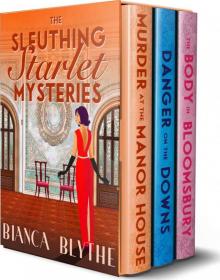 The Sleuthing Starlet Mysteries
The Sleuthing Starlet Mysteries Lords, Snow and Mistletoe
Lords, Snow and Mistletoe The Body in Bloomsbury
The Body in Bloomsbury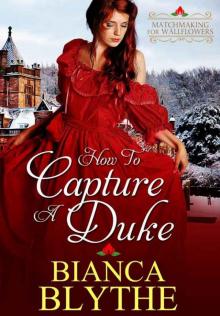 How to Capture a Duke (Matchmaking for Wallflowers Book 1)
How to Capture a Duke (Matchmaking for Wallflowers Book 1) Don't Tie the Knot
Don't Tie the Knot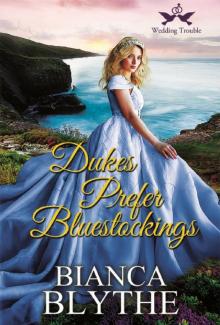 Dukes Prefer Bluestockings
Dukes Prefer Bluestockings A Marquess for Convenience (Matchmaking for Wallflowers Book 5)
A Marquess for Convenience (Matchmaking for Wallflowers Book 5) Lords, Snow and Mistletoe: A Regency Christmas Collection
Lords, Snow and Mistletoe: A Regency Christmas Collection Don't Tie the Knot (Wedding Trouble Book 1)
Don't Tie the Knot (Wedding Trouble Book 1)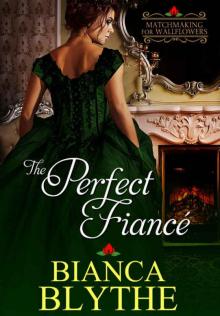 The Perfect Fiancé (Matchmaking for Wallflowers Book 0)
The Perfect Fiancé (Matchmaking for Wallflowers Book 0)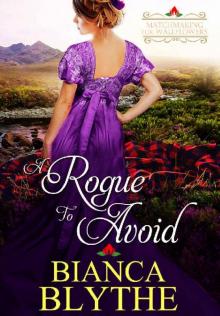 A Rogue to Avoid (Matchmaking for Wallflowers Book 2)
A Rogue to Avoid (Matchmaking for Wallflowers Book 2)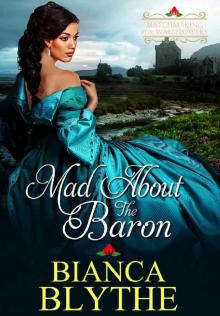 Mad About The Baron (Matchmaking for Wallflowers Book 4)
Mad About The Baron (Matchmaking for Wallflowers Book 4)